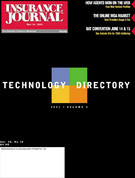London-based Benfield Greig Group plc and E.W. Blanch Holdings Inc. of Dallas, have agreed on merger terms. Benfield offered to purchase the outstanding shares of EWB for $13.50 a share, valuing the transaction at around $179 million. When completed, the new company will become the world’s third largest reinsurance broker. Only Aon Corp. and Marsh, Inc.’s Guy Carpenter are bigger.
Benfield Greig was formed in 1997 by the merger of the Benfield Group with another London broker, the Greig Feister Group, shortly after the untimely death of Benfield’s chairman, British financier Matthew Harding. David Haggie, Benfield’s financial advisor, called Harding “a fascinating character and a great businessman,” and credited him with the company’s success. A legend in financial and insurance circles, Harding also owned part of London’s Chelsea Football Club, one of England’s most famous soccer teams.
“Benfield’s is the world’s largest privately held reinsurance broker, and the fifth largest in gross revenues,” said a company spokeswoman. The company has a global reach with offices in Europe, Asia and North America, but is underrepresented in the U.S. market. Benfield expects the acquisition of EWB to cure that weakness.
“Our clients cover a very wide range,” said the spokeswoman. They include “most major Re’s and insurers like Royal & Sun Alliance, CGNU, Zurich Re, Hannover Re, a number of Lloyd’s syndicates and several large Japanese and Australian companies. About 25 to 30 percent of our business is placed with the Lloyd’s market. We are best known for catastrophe reinsurance and retrocessional programs, but we also have a strong position in treaty reinsurance.”
Benfield’s track record shows it’s an extremely well run company. It was named “The International Reinsurance Broker of the Year” in 1999 in a competition sponsored by Lloyd’s and last year was similarly honored by Lloyd’s, Reactions Magazine, and the British insurance Awards. It also was named the winner of Zurich Re’s Award for the Reinsurance broking initiative of the Year 2000 for its ReMetrca II program.
Benfield’s year 2000 total revenues of £139.8 million ($201.66 million) and EWB’s $208.2 million make the two companies roughly equivalent. But while Benfield was earning pre-tax profits of £37.7 million ($54.38 million) on its turnover, EWB was making losses. According to the Market Guide, “Net loss totaled $9.6 million vs. an income of $39.7 million. Revenues reflect the absence of workers’ compensation reinsurance and placement revenues. Loss reflects $9.5 million in restructuring charges and higher SGA expenses.”
EWB was particularly hard hit by its exposure to Unicover related losses, and the share value of the company’s stock nose-dived from around $55 per share a year ago to less than $8 before the merger announcement. As a result, two shareholder suits naming various officers and directors were recently filed alleging failure to disclose the bad news to investors who bought shares between October 1999 and March 2000.
The company’s troubles were further compounded by the loss last March of two top executives, Rodman Fox and Paul Karon, who left EWB following a management dispute to join Benfield. Fox, whom Haggie described as “a real insurance professional,” became the head of Benfield’s U.S. operations and is credited with increasing turnover there to over $30 million, 15 percent of Benfield’s total.
Last January Ted Blanch, who had taken over as CEO at EWB from his father, the firm’s founder, stepped down to become chairman emeritus. The company named Chris Walker to replace him with a mandate to find a partner and straighten things out. The search didn’t take long. Commenting on the selection of Benfield, Walker stated, “Our board conducted an extensive process examining our options and determined that this transaction best meets our goal of delivering value to our shareholders.”
Fox’s position at Benfield gave the U.K. broker the inside track. “It’s fair to say that Rodman Fox’s knowledge of E.W. Blanch and its people was invaluable,” said Haggie. “The people at E.W. Blanch are firmly committed to this deal and have every confidence in his management abilities.” He indicated that Fox was expected to become the new CEO of U.S. operations for the combined group, which will be renamed Benfield Blanch.
There is duplication, notably in cities where both firms have offices—such as London and New York—but generally the two companies appear to be complementary. For example, EWB has offices in San Francisco, Calabasas and San Jose, while Benfield has no offices in California. Haggie said it was “too early to make any decisions on office restructuring,” but indicated that generally this would be a function of the market each company serves.
At least 75 percent of the shareholders of both companies must ratify the agreement. Benfield’s shareholders, which include its management and several large insurance companies, irrevocably committed to vote for the acquisition in an April 23 action. No other bidders have appeared, and the boards of directors of both companies have already given their approvals.
Was this article valuable?
Here are more articles you may enjoy.


 Preparing for an AI Native Future
Preparing for an AI Native Future  Insurify Starts App With ChatGPT to Allow Consumers to Shop for Insurance
Insurify Starts App With ChatGPT to Allow Consumers to Shop for Insurance  Florida Regulators Crack the Whip on Auto Warranty Firm, Fake Certificates of Insurance
Florida Regulators Crack the Whip on Auto Warranty Firm, Fake Certificates of Insurance  Fla. Commissioner Offers Major Changes to Citizens’ Commercial Clearinghouse Plan
Fla. Commissioner Offers Major Changes to Citizens’ Commercial Clearinghouse Plan 


